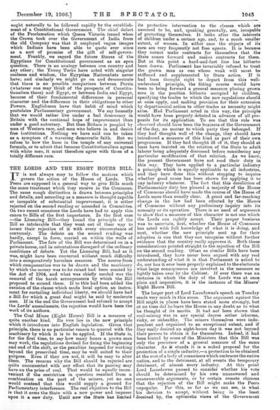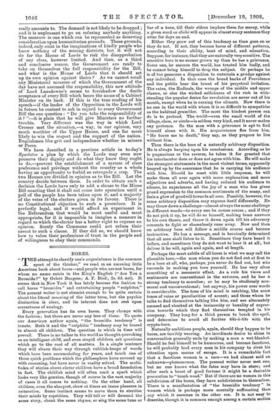THE LORDS AND THE EIGHT HOURS BILL.
IT is not always easy to follow the motives which - govern the action of the House of Lords. The Peers are supposedla a general way to give Bills much the same treatment which they receive in the Commons. The same rough distinction is drawn between principles and details, and according as a measure is thought capable or incapable of substantial improvement, it is either rejected on the second reading or amended in Committee. On two recent occasions the Lords have had to apply this canon to Bills of the first importance. In the first case —the Licensing Bill—they found the principle of the Dill so intolerable that they went out of their way to invest their rejection of it with every circumstance of contumely. The debate on the second reading was hardly, except in form, carried on within the walls of Parliament. The fate of the Bill was determined on in a private house, and in ostentatious disregard of the ordinary conditions of debate. Yet the Licensing Bill, bad as it was, might have been converted without much difficulty into a comparatively harmless measure. The source from which compensation was to be drawn and the machinery by which the money was tole raised had, been created by the Act of 1904, and what was chiefly needed was the removal of the harsh arrangements by which the Bill proposed to extend them. If to this had been added the excision of the clause which made local option an instru- ment for curtailing individual liberty, we should have had a Bill for which a great deal might be said by moderate men. If in the end the Government had refused to accept the Lords' amendments, the rejection would have been the work of its authors.
The Coal Mines (Eight Hours) Bill is a measure of quite another kind. Its vice lies in the new principle which it introduces into English legislation. Given that principle, there is no particular reason to quarrel with the machinery by which it is to be applied. If the State is, for the first time, to say how many hours a grown man may work, the regulations devised for fixing the beginning and end of the shift, or the penalties imposed for working beyond the prescribed time, may be well suited to their purpose. Even if they are not, it will be easy to alter them. The reasons why the Bill should be rejected are quite unconnected with any effect that its passing may have on the price of coal. That would be equally incon- venient if the restriction in question resulted from a combination on the part of the miners, yet no one would contend that this would supply a ground for Parliamentary interference. The real objection to the Bill is that it arms the State with a new power and imposes upon it a new duty. Until now the State has limited its protective intervention to the classes which are assumed to be, and, speaking generally, are, incapable of protecting themselves. It looks after the interests of children under a certain age, and, to a much smaller extent, of women. In either case the objects of its care are very frequently not free agents. It is because they cannot make contracts for themselves that the State comes forward and makes contracts for them. But at this point a hard-and-fast line has hitherto been drawn. Parliament has invariably refused to treat the grown man as one whose weak will must be stiffened and supplemented by State action. If it had been thought right to depart from this well- understood principle, the fitting course would have been to bring forward a general measure placing grown men in the position hitherto occupied by children, specifying the trades to which the new regulations should at once apply, and making provision for their extension by departmental action to other trades as necessity might arise. Had Parliament acted in this way, the principle would have been properly debated in advance of all pro- posals for its application. To see that this rule was observed should have been the business of the Government of the day, no matter to which party they belonged. If they had thought well of the change, they should have introduced a measure of this kind as part of their own programme. If they had thought ill of it, they should at least have insisted on the relation of the State to adult labour being adequately discussed before considering any particular modification of that relation. As we know, the present Government have not read their duty in this way. They have applied to a particular industry a principle which is equally applicable to all industries, and they have done this without stopping to inquire whether good cause has been shown for applying it to any industry whatever. The fact that this dereliction of Parliamentary duty has pleased a majority of the House of Commons should have made the course of the House of Lords more than usually clear. A great and far-reaching change in the law had been effected by the House of Commons without any preliminary inquiry into its necessity or its operation. There is no need of argument to show that a measure of this character is not one which the Lords can rightly accept. Their proper business was to ascertain, first, whether the House of Commons. has acted with full knowledge of what it is doing, and next, whether the new principle sent up for their adoption is one that they can recognise without further evidence that the country really approves it. Both these considerations pointed straight to the rejection of the Bill on the second reading. Often as similar Bills have been introduced, they have never been argued with any real understanding of what it is that Parliament is asked to do, nor has it ever been properly explained to the electorate -what large consequences are involved in the measure so lightly taken over by the Cabinet. If ever there was an instance in which the duty of the Lords was at once plain and imperative, it is the instance of the Miners' Eight Hours Bill.
The larger part of Lord Lansdowne's speech on Tuesday reads very much in this sense. The argument against the Bill might in places have been stated more strongly, but at no time did he leave the House in any doubt as to what he thought of its merits. It had not been shown that coal-mining was in any special degree either irksome, risky, or unhealthy. The miners themselves were inde- pendent and organised to an exceptional extent, and if they really desired an eight-hours day it was not beyond their powers to obtain it for themselves. Indeed, it had been hinted by some of the Ministers that this Bill was only the precursor of a general measure of the same character. As it stands it is a naked proposal for the protection of a single industry,—a protection to be obtained at the cost of a body of consumers which embraces the entire nation, and to the detriment, at all events the temporary detriment, of almost every industry. At this point Lord Lansdowne paused to consider whether his vote should be determined by his own unanswered and unanswerable arguments, or by certain remote chances that the rejection of the Bill 'might make the Peers unpopular. For this, so far as we can see, is what his decision to accept, without being in the least deceived by the optimistic views of the Government really amounts to. The demand is not likely to be dropped. ; and it is unpleasant to go on refusing anybody anything. The measure is one which can be represented as deserving consideration upon humanitarian grounds. These grounds, indeed, only exist in the imaginations of kindly people who know nothing of the mining districts, but it will not do for the House of Lords to risk the disapprobation of any class, however limited. And then, as a third and conclusive reason, the Government are ready to take on themselves the full responsibility for the Bill, and what is the House of Lords that it should. set up its own opinion against theirs ? As we cannot recall any Ministerial measure of which the Government of the day have not assumed the responsibility, this new attitude of Lord Lansdowne's seems to foreshadow the docile acceptance of every Bill which bears the name of a Cabinet Minister on its back. If this is the true reading of his speech—if the leader of the Opposition in the Lords will in future be content to ask in regard to every Government Bill the one question : "Do you take the responsibility of it ? "—it is plain that he will give Ministers no further trouble. Very different was the way in which Lord. Cromer met the situation,—a way, in our opinion, very much worthier of the Upper House, and one far more likely to win the respect and the support of the nation. Englishmen like grit and independence whether in miners or Peers.
We have described in a previous article in to-day's Spectator a plan by which the Lords may even now preserve their dignity and do what they know they ought to do,—prevent the establishment of a system of class preference and privilege without the country as a whole having an opportunity to forbid so retrogade a step. The two Houses are divided in opinion as to the Bill. Let the county decide between them. In order to obtain such a decision the Lords have only to add a clause to the Mines Bill enacting that it shall not come into operation until a poll of the people has been taken upon it, and a majority of the votes of the electors given in its favour. There is no Constitutional objection to such a procedure. It is perfectly legal, and it would. afford an experiment in the Referendum that would be most useful and most appropriate, for it is impossible to imagine a measure in regard to which the elector has a better right to express an opinion. Surely the Commons could not refuse their assent to such a clause. If they did so, we should know how to value their professions of trust in the people and of willingness to obey their commands.















































 Previous page
Previous page